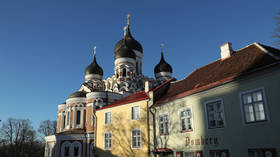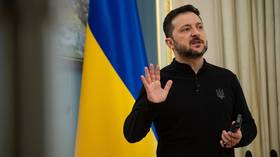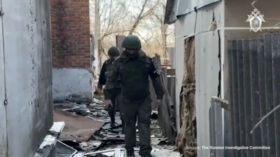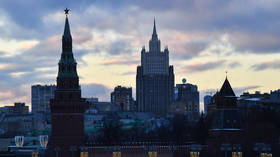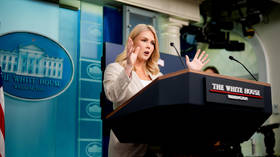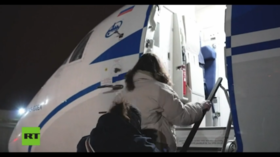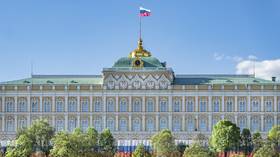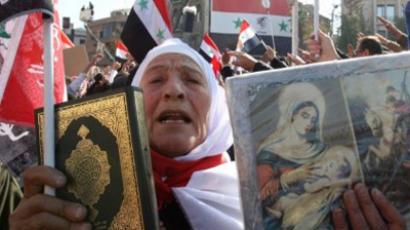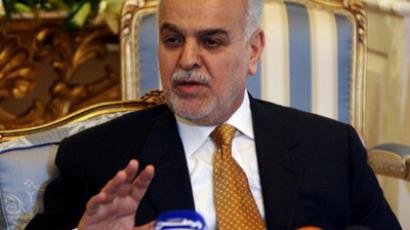Bombs welcome new UN chief monitor in Syria
The head of the new UN observer team is starting his work in Syria amid sporadic violence. On Monday, twin suicide bombers killed at least nine people and wounded nearly a hundred, fuelling doubts over how long the shaky ceasefire can hold.
The two suicide attackers set off explosive-rigged cars near a state intelligence compound in the north-western city of Idlib, the Syrian state media reported. They killed at least nine and wounded almost 100 people, including security officers and civilians. The Britain-based human rights organization Syrian Observatory puts the death toll higher, saying more than 20 people have been killed.Pro-government al-Ekhbariya TV aired grizzly footage of the aftermath, showing smashed cars, debris and blood stains on the pavement. The explosions tore the facade off of a multi-storey building and damaged four others. Debris was sent flying hundreds of meters.No group immediately claimed responsibility for the act. The media blamed “armed terrorists”, but the term is routinely used by the Syrian government to describe any armed opposition group.The new act of violence comes as Norwegian Major General Robert Mood is paving the way for a full 300-strong monitoring team, which is to be deployed in the coming months.The 52-year-old veteran peacemaker, who takes over the UN Mission in Syria, is no stranger to Damascus. Between 2009 and 2011 he headed the UN Truce Supervision Organization, which monitors Middle East cease-fires, and visited Syria.On arrival he called on both the government and opposition groups to co-operate with the UN, saying the effort of the monitors alone is not enough to defuse the situation.Currently the observer mission has 15 people on the ground, monitoring the situation in some of most troubled areas like Homs, Hama, Idlib, Derra and the Damascus suburbs.
Reports of the ceasefire being occasionally broken by both loyalist forces and opposition groups continue. Apparently, rebel groups not willing to stop their struggle with the government are increasingly resorting to guerrilla tactics.Late on Sunday militants fired rocket-propelled grenades at the Central Bank building, causing slight damage, and wounding four patrolling police officers, state television reported. A separate attack in eastern Deir ez-Zor on Sunday damaged an oil pipeline. Five explosions were heard in Damascus on Friday. A suicide bomber attacked killed 11 people and injured dozens, including civilians and law-enforcement personnel.The Syrian Army has carried out attacks on armed opposition forces in areas close to the Turkish and Lebanese borders, according to Al Jazeera. The offensive followed Saturday’s attempts by a militant group to deploy in the coastal area near Latakia, Syria’s largest port city.In neighboring Lebanon local intelligence officials intercepted a ship carrying three containers filled with Libyan heavy machine guns, shells, rockets, rocket launchers and other explosives they claim was intended for the armed opposition group, the Free Syria Army.Nevertheless observers agree that the level of violence has dropped sharply after the ceasefire was announced on April 12 and remains relatively low.On Monday, more than 170 opposition activists agreed to lay down their arms in exchange for an amnesty, SANA state news agency reported. A hundred and thirty of them were from the Idlib Governorate, while the others were active in the Damascus suburbs. The agency says about a thousand militants, who were not involved in major crimes surrendered under the amnesty since the ceasefire was announced.
Kurdish sovereignty dream moved forward
While Syria is trying to move away from violence, one ethnic group seems to have benefited from the turmoil – by not taking sides in the conflict, RT’s Oksana Boyko reports. Just a year ago, even speaking Kurdish in public could have got Syrian Kurds into trouble; but now they can sing openly what some hope will become the anthem for their future state.The Kurds are the world's largest ethnic group without a nation and have felt like outsiders in their own land. In Syria, where they make up around 10 percent of the population, Kurds have for decades complained of tacit discrimination by the authorities. They called on President al-Assad to step down years before it became the rallying cry of the Syrian opposition.Despite long running grievances against the Assad family, Syrian Kurds have largely stayed out of the conflict. In fact, if there is any group that has benefited from the instability in Syria, it must be them. Over the past year, Syrian Kurds have won more concessions from the government than in the previous twenty.RT visited a Kurdish-language school – one of about a dozen that have opened their doors in Syria over the past few months. Grandmothers share desks with grandchildren in a determined attempt to learn the classic version of their mother tongue.Jamil Sheckdahdu, the school's principle, says, just a year ago, it had to be done in secret:“The state didn't allow any instruction in Kurdish. We used to be told that since we are living in an Arab country – we should speak Arabic. Books, even songs in Kurdish – were all forbidden but nowadays it all has changed,” he explained.It's not only Syria where Kurds felt pressured. In Turkey, Iraq and Iran, where the majority of about 40 million Kurds now live, the authorities had long seen them as a threat to national security, especially after they embraced guerrilla warfare to achieve the creation of a sovereign Kurdish state.And in Syria these days, it seems, at least for now, this goal has been realized. About a month ago, Kurds living in Aleppo opened their own version of a city hall. There the portrait of Abdullah Ocalan, the face of Kurdish independence, hangs where you’d usually expect a picture of the President.“We, the Kurds, are neither with the government nor with the opposition. We stand alone. The Syrian state has bigger problems so we are taking charge of our areas and try to govern ourselves,” Kurdish businessman Fausi Mustafa told RT.For the time being, Syrian Kurds claim self-governance and equal rights are all they want. Some say, autonomy within Syria, similar to the Kurdistan region of Iraq, would be a more realistic alternative to full-fledged independence.“Syrian Kurds don’t want a separate state. We want to live in Syria in peace with the Arabs, Christians and everybody else. But we do want to be treated equally and to be recognized as the Kurds on our IDs, not as Syrian Arabs,” said Farhad Sharif a pharmacist in Aleppo.Yet, dozens of Kurdish settlements within Syria have already become de facto mini sovereign states. They are not only self-governed but self-policed as well. There are well-defined borders, with check-points separating Kurdish and Arab parts of town and militia border guards. While the central government is distracted with its own struggle, they are seizing the opportunity."Patience is bitter, but it bears sweet fruit.” This old Kurdish proverb is frequently used in Syria these days. But what's unclear is how long this new found independence may last.




